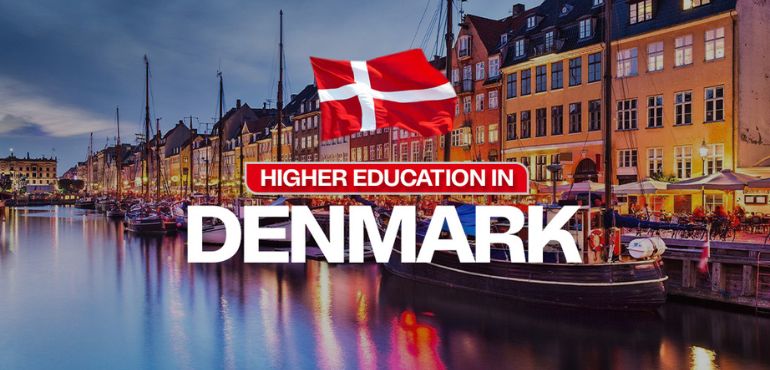
Denmark is renowned for its top-tier educational system, which emphasizes innovation, creativity, and collaboration. Danish universities and institutions offer a range of degree programs, including bachelor’s, master’s, and doctoral levels, all designed to foster critical thinking and independence. Prominent universities such as the University of Copenhagen, Aarhus University, and Technical University of Denmark are globally recognized for their research-driven education. Denmark offers a unique learning environment with over 700 English-taught programs, making it a popular choice among international students. The Danish educational system values sustainability, inclusivity, and practical skills, equipping students with the knowledge and experience needed for a successful international career.
Studying in Denmark provides students with access to a high-quality education in a supportive, inclusive environment. Danish universities emphasize real-world applications, innovation, and entrepreneurship, making them ideal for students seeking to expand their professional skills. Denmark’s teaching approach is collaborative, with a focus on project-based learning and student engagement. The country also has one of the highest standards of living globally, with a focus on green initiatives and environmental responsibility. Denmark’s culture of openness, equality, and creativity makes it a fantastic place to grow both academically and personally. With numerous scholarships available for international students, Denmark combines quality education with a unique lifestyle experience.
Applying to Danish universities is straightforward and typically done online. International students apply through the centralized platform “Optagelse.dk” for undergraduate programs, while postgraduate applicants apply directly to the university. Requirements vary based on the program and may include previous academic transcripts, language proficiency tests like IELTS or TOEFL for English programs, and sometimes additional requirements like a motivation letter or interview. Application deadlines usually fall in March for autumn admission and October for spring admission. Non-EU/EEA students must also apply for a residence permit after acceptance, and they are advised to plan early to accommodate processing times.
Tuition in Denmark is free for EU/EEA students, but non-EU/EEA students are required to pay tuition fees that typically range from €6,000 to €16,000 annually, depending on the program and institution. Danish universities offer various scholarships and funding options to help reduce these costs for non-EU/EEA students. Living costs in Denmark are generally high compared to other countries, with Copenhagen being particularly expensive. Students should budget around €800 to €1,400 per month for accommodation, food, transportation, and other essentials. However, student discounts and subsidized public transportation make it manageable for students, and many find part-time jobs to support their expenses.
Denmark offers a range of scholarships for international students, especially for non-EU/EEA applicants. The Danish government and universities provide various grants and scholarships, such as the Danish Government Scholarships and Erasmus Mundus scholarships. Many universities offer merit-based scholarships that cover partial or full tuition fees for international students. Scholarships are often awarded based on academic performance, and some programs automatically consider applicants for funding opportunities. Students are encouraged to research and apply early, as funding options are competitive.
Student life in Denmark is dynamic and enriching, with a balance between academic responsibilities and social activities. Danish culture encourages students to pursue hobbies, participate in student associations, and engage in various cultural and social events. University towns like Copenhagen, Aarhus, and Odense offer a range of events, from music festivals to sports clubs and cultural gatherings. Denmark is known for its welcoming and diverse society, where equality and environmental responsibility are core values. Additionally, Denmark's natural beauty, from serene coastlines to vibrant cityscapes, offers students plenty of options for leisure and adventure. Danish cities are safe, and the country is known for its high quality of life and excellent public services.
Accommodation in Denmark is available through university housing, private rentals, and shared apartments. On-campus housing is limited, so international students are encouraged to apply early. Rent varies significantly based on location, with prices ranging from €300 to €800 per month. Student housing organizations, such as housing cooperatives and private landlords, offer various options near university campuses. While living in larger cities like Copenhagen may be more expensive, smaller towns offer more affordable accommodation. Students are encouraged to seek advice from university housing offices to find suitable and affordable options.
Denmark provides excellent healthcare services, and international students are covered under the Danish National Health Service if they are staying for more than three months. EU/EEA students can access healthcare services with a European Health Insurance Card (EHIC), while non-EU/EEA students must register for the Danish health insurance system upon arrival. For students staying less than three months, private health insurance is recommended. The healthcare system in Denmark is well-regarded for its quality, accessibility, and efficiency, providing students with peace of mind regarding health coverage during their studies.
Non-EU/EEA students must obtain a residence permit to study in Denmark. After receiving an acceptance letter, students can apply for the permit through the Danish Immigration Service website, providing documentation such as proof of financial resources, health insurance, and a valid passport. Processing can take several months, so early application is advisable. EU/EEA students do not need a visa or residence permit but should register with the local municipality if staying longer than three months. A residence permit allows students to work part-time during their studies, providing flexibility to support themselves while studying in Denmark.
Denmark offers excellent post-graduation opportunities, including a post-study residence permit that allows non-EU/EEA graduates to stay for up to six months to seek employment. Denmark’s job market is thriving, especially in sectors like technology, engineering, environmental sciences, and healthcare. The country’s vibrant start-up scene and focus on sustainability attract professionals from around the world. Graduates often find Denmark an ideal place for career growth, thanks to its open work culture, English-friendly work environment, and emphasis on work-life balance. For those interested in long-term careers, Denmark’s stable economy and progressive policies make it an attractive destination.